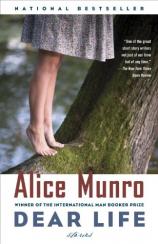Dear Life: Stories
Review
Dear Life: Stories
What can be said about Alice Munro’s luminous writing that hasn’t already been said? What unused plump adjectives might be bandied about to describe her way with words? What turn of phrase or simile might once again skirt the edge of capturing her unparalleled ability to so aptly describe those quiet moments in life that can change everything in a flash? Crossroads, they are called. A lightning bug trapped inside a jar, now free. Her latest collection, DEAR LIFE, is all of those flashy adjectives and overextended metaphors. It’s everything you want it to be, and more.
Munro has written 12 other short story collections as well as a few volumes of selected previously published stories and one novel. You’d think with this many published stories in her back pocket that maybe she’d retrace her steps, write the same story but with different characters, rely on a well-tread formula or two for some of the “filler” in the book. But such is not the case. While many reoccurring themes are explored, DEAR LIFE is as fresh and illuminating as any of her previous collections, if not more so. As another reviewer so fittingly put it, “there are no clunkers here.”
“To Reach Japan,” the first entry in the collection, finds Greta and her young daughter Katy on a train to Toronto to housesit a friend’s home for a month while Greta’s husband --- and Katy’s father --- begins a new job elsewhere. While on the journey, the normally quiet and contained Greta gets too deep in the drink with a younger fellow they meet on the train and, in a moment of lusty abandon, loses track of Katy. Of course, mother and daughter are reunited, but not without Greta feeling the full weight of what might have happened. Still, it doesn’t stop her from kissing back when a newspaper columnist she met at a party a few months earlier greets her on the platform in Toronto. As the pins line up, there’s plenty to noodle over in this brief glimpse into the life of a subconsciously unhinged mother possibly unhappy in her marriage, definitely looking for a change.
"While many reoccurring themes are explored, DEAR LIFE is as fresh and illuminating as any of [Munro's] previous collections, if not more so. As another reviewer so fittingly put it, 'there are no clunkers here.'"
In “Leaving Maverley,” Morgan, a half-curmudgeonly small town movie theater projectionist, and his doting wife take a wayward girl named Leah under their wing who, not long after, runs off with the minister’s son. As is often the case in Munro’s stories, time isn’t kind to any of the three, doling out tragedy in droves. Leah’s marriage fails, causing her to lose her children. But it’s Morgan’s loss of his wife (to cancer) that stings the most. “But the emptiness in place of her was astounding…. What he carried with him, all he carried with him, was a lack, something like a lack of air, of proper behavior in his lungs, a difficulty that he supposed would go on forever.”
Tackling loss --- and blame --- from a different angle, “Gravel” is the story of two sisters who live in a ramshackle trailer by a water-filled quarry after their mother left their sturdy, boring father for a younger, wilder man. When one sister drowns in the gravel pit on the other’s watch, there’s no question who is to blame. Their mother, a little too wild? The boyfriend, too stoned to jump in and save her? Or the narrator who stood by, watching her sister drown? As you might expect, it’s the dead sister’s voice that calls out the strongest here: “Caro keeps running at the water and throwing herself in, as if in triumph, and I’m still caught, waiting for her to explain to me, waiting for the splash.”
Death. Love. Loss. Guilt. Shame. Lust. Loneliness. It’s all poured over the coals in the stories throughout DEAR LIFE. But here’s the kicker. There’s an unprecedented finale tacked on at the book’s end. Here, 81-year-old Munro writes, “The final four works in this book are not quite stories. They form a separate unit, one that is autobiographical in feeling, though not, sometimes, entirely so in fact. I believe they are the first and last --- and the closest --- things I have to say about my own life.” [!!!] While these selections show none of the careful kneading and precise crafting so present in her fiction, it’s perhaps just that raw, messy stream-of-consciousness that makes them so interesting to read.
** As a reviewer’s side note, here’s a tip: If you have access to the Winter 2012 issue of Granta, pick it up. Why? Aside from the fact that it’s a well-curated journal that highlights the latest and greatest stories from Literary Greats such as Munro, this particular issue includes a story entitled “In Sight of the Lake” that is also included in DEAR LIFE. Here, an aging woman who seems to be losing her memory embarks on a drive in search of an “Elderly Specialist.” As one might expect, she loses her way and has difficulty finding the doctor’s office. I won’t spoil the ending, but suffice it to say, the ending in DEAR LIFE and the ending in Granta *aren’t the same!* I’m not sure I’ve ever had the pleasure of being treated to two slightly dissimilar endings that resonate very differently on the palate. It’s an exercise that not only shows readers the myriad paths a story could follow, but also Munro’s writing process as well.
Reviewed by Alexis Burling on November 16, 2012
Dear Life: Stories
- Publication Date: July 30, 2013
- Genres: Fiction, Short Stories
- Paperback: 336 pages
- Publisher: Vintage
- ISBN-10: 0307743721
- ISBN-13: 9780307743725





